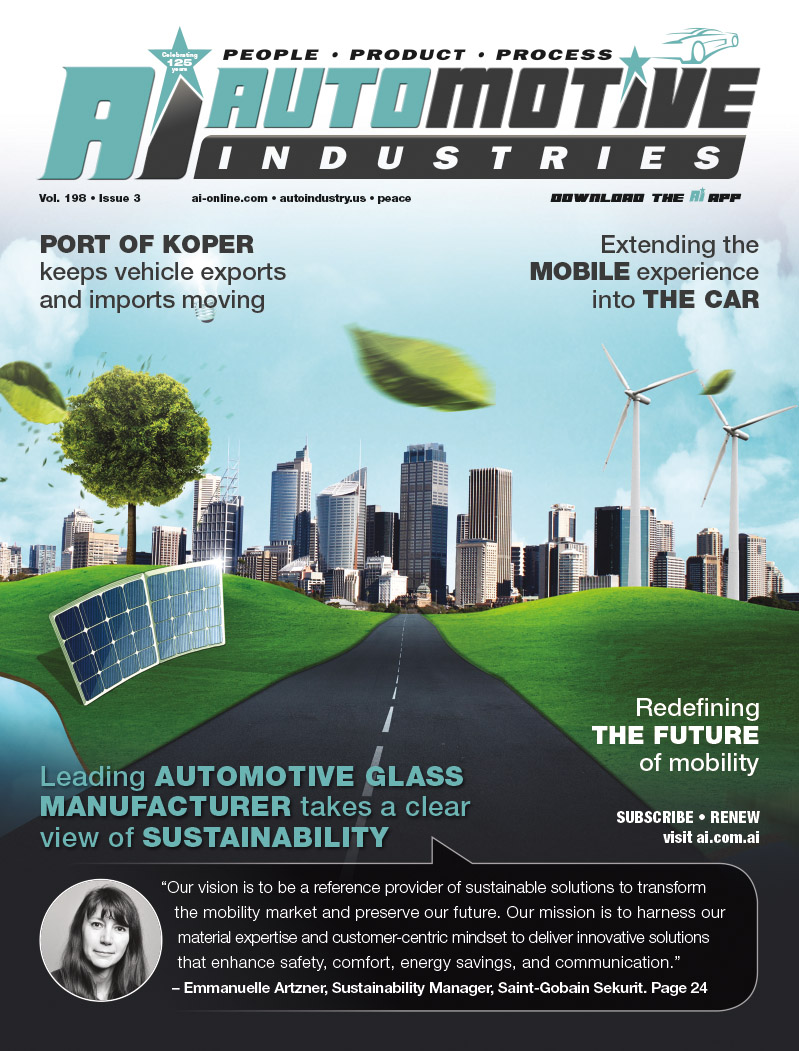
There is a global emphasis on reducing the environmental cost of transport, with the focus in urban areas being the movement of commuters.
While car-sharing, car-pooling, public transport, robot-taxis and autonomous vehicles are seen as solutions to reducing the environmental impact of mobility in the industrialized world at least, manufacturers can make an impact today through the design of their components and manufacturing processes. Companies like Saint-Gobain Sekurit have introduced continuous optimization programs for both. The company has developed the thinnest glass available on the automotive market – SGS LightWeight® – which reduces vehicle fuel consumption and therefore CO2 emissions thanks to the weight saving. A holistic approach to manufacturing has resulted in the company’s new Bhiwadi plant in India being designed from inception with features to support sustainability: 100% of the roof rain water is collected and harvested, which reduces the strain on the municipal suypply by around 8,400m3 a year. Another example is the Saint-Gobain plant in Eslov, Sweden, where a program of producing zero non-recovered waste initiated in 2015 is due to come to fruition during 2019. In December 2018 Saint-Gobain Sekurit received the Sustainability Supplier of the Year Award from the carmaker Fiat Chrysler Automobiles (EMEA).
Automotive Industries (AI) asked Emmanuelle Artzner, Sustainability Manager, Saint-Gobain Sekurit, to share the company’s vision and mission for its sustainable journey. Artzner: Our vision is to be a reference provider of sustainable solutions to transform the mobility market and preserve our future. Our mission is to harness our material expertise and customer-centric mindset to deliver innovative solutions that enhance safety, comfort, energy savings, and communication.
AI: When thinking about sustainability in the mobility sector is the electric vehicle the first that comes to mind? Artzner: Of course, the electric vehicle is a big sustainable step in the mobility sector but Saint-Gobain Sekurit also commits to sustainable mobility by reducing the environmental impacts of glazing existing production vehicles. When we reduce the weight of our product, we reduce the car weight and it’s CO2 emission. We will also contribute to Saint-Gobain group target to achieve net-zero carbon emissions by 2050.
AI: How would car-sharing, car-pooling, public transport, robot-taxis and future autonomous vehicles outline the new face of mobility? Artzner: For now, electric cars are not affordable for a big part of the population. Alternative solutions have to be found. As far as I am concerned car-sharing, car-pooling and public transport are current tools to achieve this sustainability journey. In the future, we have to think about other more solutions than just electric-cars. This is why robot-taxis and future autonomous vehicles would in the future play a key role in the new face of mobility.
AI: What innovative solutions do you offer in terms of enhancing safety, comfort, energy saving and communication? Artzner: We have developed thermal glazing in order to keep comfort for car passenger and to reduce vehicle fuel consumption and CO2 emissions for maximum efficiency. Concerning energy saving, we have taken several actions in our manufacturing plants to limit our environmental impact with having dedicated programs on energy consumption reductions. The circular economy is also an important topic with strong efforts to improve cullet recycling. By recycling one ton of cullet we save 300 kg of CO2 emission compared to using raw material. Our objective is also to develop sustainable and comfortable solutions that guarantee the wellbeing of both individuals and society as a whole. These are the fundamentals of the Saint-Gobain Sekurit promise. They are also the basis of our Corporate Social Responsibility (CSR), through commitments made to our teams, customers and local communities. It is expressed in public commitments and concrete objectives in response to strategic issues in sustainable mobility, regional development and new social practices.
AI: What local actions do you take to ensure that you follow your path to sustainability? Artzner: A great example is the pilot project on zero-waste launched in Eslov plant in Sweden five years ago. The project is due to be completed this year with reaching the target of 0 tons of non-recovered waste, through successful collective intelligence approach, training programs and development of partnership with new recyclers. We are also working on water usage to reduce our plant’s environmental impact. In some areas of the world the environment is very sensitive to water withdrawal and we are careful of the impact of our operations.
AI: How would your employees be engaged in this sustainability journey? Artzner: The Eslov team received the first Saint-Gobain Sekurit “Award on Sustainability” in November 2019. Employees are very proud of their achievements so far. This selection will recognize their circular economy vision to avoid waste generation. Some Eslov employees participate to RynKeby, a Nordic charity cycling team that travels from Denmark to Paris by bike, in order to raise money for the Child Cancer Foundation in Sweden.
AI: What’s next for Saint-Gobain Sekurit? Artzner: Enhancing a sustainable drive in the mobility market with new eco-innovations.












More Stories
Automotive Industries (AI) Newsletter April 2025
GlobalLogic Pioneering Software-Defined Vehicles, AI Innovation, and Sustainable Solutions for the Future of Automotive Mobility
Cybord TCI – The Future of Manufacturing Integrity